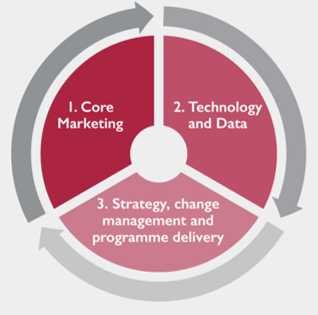Few can deny the world of marketing has been subject to fast and furious developments in recent times. In this article Berkeley looks at three big shifts in expectations for the marketing function as a result of these developments, and identifies three big capabilities we believe marketing leaders need now and for the future.
Three big shifts in expectation
Now, as always, companies have looked to marketing to increase customer reach and engagement, grow brand awareness and loyalty, deliver a return on marketing investment, and ultimately contribute to the company’s growth. Marketing has responded through its core capabilities of:
- Building customer and market insight
- Developing brand strategies and brand propositions
- Innovating products and promotions
- Executing marketing campaigns
- Managing brand and campaign performance.
However, the constant pace of change today – driven by mobile and digital, and by consumers demanding more purposeful and personalised engagement – means that marketing’s role has changed, and there is no turning back.
We see three big shifts in the expectations of marketing.
1. Leading organisational development and redesign around the customer
There has been an emergence of the ‘interconnected’ marketing function, where customer-focused companies have moved away from marketing as a single department with discrete responsibilities, to it becoming a coordinating discipline that orientates the rest of the company towards truly understanding, communicating with and satisfying the customer’s needs.
There is a growing expectation that marketing becomes a central force in strengthening the company’s ethos, leading to re-designing of the sales function and other customer-facing operations, reorganising of relevant departments and teams, and setting the direction for the customer facing skills and resources it needs.
In addition to more strongly influencing the rest of the company, marketing leaders have had to reorganise their own teams. They are having to shift their teams’ ways of working from traditional annual and quarterly communication planning and delivery, to being more fleet-of-foot and always on – able to engage with customers in real time and deliver content as the conversation unfolds on digital and social media.
As a result, marketing managers are facing tough new questions they may not have faced before…
As a result...
Marketing managers are facing tough new questions they may not have faced before
What...
... should I ensure is done within the marketing teams and what should be the responsibility of other customer teams in the company?
How...
... do I achieve alignment between our marketing team, our other customer-facing teams, and our crucial support functions that control customer systems and data?
2. Harnessing data and technology
Similarly, companies are beginning to look to their marketing teams, in addition to IT, for guidance on the emerging big data and analytics agenda. They often see marketing leading the way in bringing together internal and external data, including social, and transforming it into forward-looking insight that enables the company to engage with customers more purposefully and cut through the noise.
As a result...
Marketing managers are facing tough new questions they may not have faced before
Data
The data and technology out there is moving so fast I can’t keep up. Which is most critical to our company?
Relationships
What relationship should we have with our IT function to best harness this data and technology? Should they lead, should we forge ahead, or should we develop a joint approach? How do we ensure ongoing clarity of accountability between marketing and IT?
Vendors
Where we are involved, how do we manage the multitude of vendors and third parties to get to this data and technology, let alone integrate with what the company already has?
3. Driving complex change
As a result of the above, it is perhaps inevitable that there is a huge amount of interdependent and complex change that needs to happen within marketing. More than ever before, marketing must re-define direction and then deliver wide ranging transformation initiatives including operating model redesign and re-organisation, new ways of working, new skills and training, and the delivery and integration of new marketing technology and data.
As a result...
Marketing managers are facing tough new questions they may not have faced before
Perspective
We have more change initiatives than ever before. How can I get visibility of all of it and ensure that it is being delivered well? How can we make tough ‘trade-off’ choices to get the most out of our resources and budget?
Value
How can I ensure that all the changes are of real value and remain aligned to the direction we are going?
Balance
How do we get the balance right between moving quickly with pilots, prototypes and small-scale ‘test and learn’ projects versus investing in wholesale organisational change to secure the future more strongly?
Three big capabilities needed in response
The three shifting expectations have necessitated a significant reaction from the marketing function.
The core marketing capabilities remain the cornerstone of marketing – building customer and market insight; developing brand strategies and brand propositions; innovating products and promotion; executing marketing campaigns; and managing brand performance.
But now this needs to be coupled with two newer abilities. Firstly, an increased understanding of, and comfort with, technology and data so it can work with colleagues in IT and digital teams to drive the ‘big data’ and analytics agenda.
Secondly, an increased focus on, and commitment to, the strategy, change management and programme delivery disciplines that are critical to drive the high volume of complex change at high pace. Skills and experience of developing strategies and operating models, redesigning and developing functions and teams, managing programmes and projects, and selecting, managing and integrating suppliers – these are all now mandatory.

The balancing act
Berkeley believe that it is crucial for marketing leaders to achieve and maintain a balance of all three of these capabilities, in order to succeed both now and in the future.
There can be a temptation to focus on the core marketing capability only, as that has been the focus of previous generations. But going forward this will not be adequate.
Without an equal focus on the other two capabilities, marketing will struggle to continuously evolve, will struggle to play a leading role in organisational development and redesign and will struggle to harness technology and data. Even if marketing makes some progress in these areas, without the right disciplines any changes are unlikely to stick.
And of course, it is the strategy, change management and programme delivery capability that will get the marketing function ready for tomorrow…









